- News & Highlights
- Publications and Documents
- Postgraduate Education
- Browse Our Courses
- C/T Research Academy
- K12 Investigator Training
- Translational Innovator
- SMART IRB Reliance Request
- Biostatistics Consulting
- Regulatory Support
- Pilot Funding
- Informatics Program
- Community Engagement
- Diversity Inclusion
- Research Enrollment and Diversity
- Harvard Catalyst Profiles


Leadership Strategies for the Researcher
Course focusing on best practices in leading and managing a team
For more information:
Course goals.
- Understand the different factors that contribute to managing, leading, and maintaining a successful research team.
- Understand the roles that each member of a team contributes to the overall success and advancement of a project.
- Understand the overarching concepts that contribute to a researcher’s success within their career.
- Understand how being an effective leader will contribute to future success.
Leadership Strategies for the Researcher helps prepare clinical and translational investigators as they face the challenges inherent in establishing a research program. This one-day, in-person course features both interactive and didactic sessions, with a focus on best practices in leading and managing a team, and navigating a career path in research.
Session topics include:
- Developing a personal strategy
- Negotiation
- Communication styles and strategies
- Developing and managing team members
Session dates
April 25, 2024 | 8:00am – 5:00pm
Time commitment
This is a one-day course that will take place in person at Harvard Medical School.
Emerging clinician-researchers and principal investigators interested in building their leadership and management skills.
We believe that the research community is strengthened by understanding how a number of factors including gender identity, sexual orientation, race and ethnicity, socioeconomic status, culture, religion, national origin, language, disability, and age shape the environment in which we live and work, affect each of our personal identities, and impacts all areas of human health.
Eligibility
- MD and/or PhD involved in clinical research
- Instructors or assistant professors currently leading research teams with established funding and direct reports
- Priority will be given to individuals affiliated with Harvard schools and institutions
Free for Harvard-affiliated schools and institutions .
Accreditation Statement
The Harvard Catalyst Education Program is accredited by the Massachusetts Medical Society to provide continuing medical education for physicians.
Participants will be informed of any pre-course work requirements at least one week in advance of the course.
The application form has closed. Please check back for future opportunities.
February 11, 2022
How to Be a Great Leader in Science
Building a positive research environment requires intention, support and a belief that kindness isn’t weakness
By Alison L. Antes

FG Trade/Getty Images
There is a common narrative, in academia and beyond, that says, “You have to be a jerk to be successful.” As a scientist who studies what makes a great leader, it is disheartening how often research trainees and junior faculty in the sciences ask me if this is true.
So, it’s been an especially eye-opening week for science, as academics reflect on Eric Lander’s resignation from his roles as the director the Office of Science and Technology Policy and White House science adviser. A whistleblower investigation found that he had bullied and mistreated his staff , and seemed to be especially abusive toward women who worked with him.
Scientific research demands creative and complex work. Such creativity and technical skill thrive in workplaces that are psychologically safe and supportive . I can tell you that for every abusive supervisor, there are multitudes who inspire, nurture and respect the people who work for them. Leadership is a big responsibility, and in a field rife with setbacks, failure and pressure, it can be hard to get it right all the time. But we have to; we are losing talented people who either drop out of academic life because they have been bullied or abused, or are worried about it. These losses are a detriment to academia, science and society.
On supporting science journalism
If you're enjoying this article, consider supporting our award-winning journalism by subscribing . By purchasing a subscription you are helping to ensure the future of impactful stories about the discoveries and ideas shaping our world today.
Here are some tips on positive leadership and bolstering academics in developing and sustaining good leadership practices.
Know who you want to be.
Great leaders know what character traits they want to define their leadership. For example, integrity, honesty, kindness, optimism, passion, determination and fairness. They reflect on the traits that already define who they are and those they need to cultivate. They seek out positive role models and mentors, always seeking to learn and grow . They ask for input on their leadership from their peers, staff and supervisors and take criticism well. They are not afraid to show vulnerability and don’t feign perfection. They learn from their mistakes and couple self-confidence with humility. Great leaders strive to take care of themselves by managing their own stress and external pressure.
Know what you value in a work environment.
Great leaders know what qualities they want to define their work environments. For instance, you can value trust, openness, integrity, respect, support, accountability, cooperation, creativity, excellence, engagement, learning and inclusion. Great leaders recognize that their own behavior sets the example. They tell their team members what they value and prioritize these qualities in their decisions and actions. They bring in newcomers who are committed to these qualities and expect respectful conduct. Great leaders look for cues and ask for input to assess the status of the work environment.
Be intentional. Budget the time.
Positive leaders make creating a supportive and affirming environment an explicit priority. They make time to build trust and develop healthy working relationships. They communicate openly, listen effectively and show empathy. They treat people with respect to bring out their best.
Know and develop your people.
A powerful way that a leader can build relationships and foster effective performance is by understanding the interests and career goals of their staff, especially trainees. A great leader mentors and coaches staff, sets high expectations and provides the guidance and resources to achieve expectations. They also celebrate the small successes along the way.
Create space for everyone.
Great leaders ensure everyone gets a chance to speak, and they acknowledge everyone’s contributions. They create space for new ideas, encourage collaboration and insist that team members communicate respectfully. They establish norms for handling mistakes that makes it acceptable to mess up. They embrace productive conflict and engage in difficult conversations. They welcome different personalities, perspectives and backgrounds .
Cultivate a collaborative spirit.
A great leader supports team members in building their own trusting, healthy workplace relationships . A successful scientist once told me he tells his group they may be competing with other labs, but inside their laboratory, they are a team. Research is competitive, but ambition need not squeeze out respect, kindness, and cooperation .
Foster a safe environment.
In a safe environment, people feel respected and engage fully without fear of ridicule or judgment. They ask for help and clarification, offer solutions to problems, admit errors, raise concerns, disagree, and give and receive feedback. These behaviors are essential to conducting rigorous, trustworthy research. Leading by intimidation creates fear and anxiety. It breeds distrust, secrecy and misbehavior. It causes people to quit and impacts their mental health .
Promote a top-down positive culture.
Becoming a great leader also requires support from the top down. Institutions need to provide leadership development. They need to reward positive behavior. They need not only to have no-tolerance policies for bullying and abuse, but also to enforce those policies. Both institutions and the broader academic systems need to celebrate the success stories of great leadership and create space to discuss failures. All of these steps are critical for creating a true and lasting shift in the narrative and culture.
Might the circumstances today be different if Lander had heeded this leadership advice ? How might providing leadership training and coaching to all researchers across their careers transform academia? What if it were the norm for researchers to talk about people skills? What if research trainees and staff could count on being safe and supported in research environments? What if they felt empowered to speak up about abusive behavior?
Academics are exceptional at learning, problem-solving, and rising to a challenge. I think that we are ready to create these needed changes, and I believe that we must.
Thank you for visiting nature.com. You are using a browser version with limited support for CSS. To obtain the best experience, we recommend you use a more up to date browser (or turn off compatibility mode in Internet Explorer). In the meantime, to ensure continued support, we are displaying the site without styles and JavaScript.
- View all journals
- Explore content
- About the journal
- Publish with us
- Sign up for alerts
- NATURE CAREERS PODCAST
- 20 January 2023
Mastering the art of saying no should be part of a research leader’s toolkit
- Julie Gould 0
Julie Gould is a freelance science writer in London.
You can also search for this author in PubMed Google Scholar
Credit: Getty
Gemma Modinos tells Julie Gould how she honed her leadership skills as a young scholar.
How do you learn leadership skills as a researcher, and how well is science served by its current crop of leaders?
These are just two of the questions asked of scientific leaders from a range of different sectors and backgrounds in this five-part Working Scientist podcast series all about leadership.
In this episode, Spanish neuroscience and mental health researcher Gemma Modinos talks about her own leadership journey as a group leader at King’s College London and former chair of the Young Academy Europe.
Modinos compares “command and control” leadership styles with more collaborative approaches and says aspiring science leaders should not neglect leadership training as part of their career development.
Learning how to say no effectively and allocating time to meet looming deadlines is another key skill, she tells Julie Gould.
But should all early career researchers nurture leadership ambitions? No, says Modinos. “Not everyone has to strive to become a PI, or to be involved in chairing an organization, or being president, or being in boards,” she says.
Never miss an episode: subscribe to the Nature Careers Working Scientist podcast on Apple Podcasts , Google Podcasts , Spotify or your favourite podcast app. And please leave a review. Your feedback is important to us.
doi: https://doi.org/10.1038/d41586-023-00130-0
Julie Gould: 00:09
Hi, it's Judy Gould, and this is Working Scientist , a Nature Careers podcast. Welcome to this series on the podcast, All About Leadership.
Each episode in this series explores leadership from a different perspective. We hear from academic leaders, research institute leaders, industry leaders, young leaders, as well as someone who studied leadership and what it really means. I tried to find out what these people think leadership is, how they got to these positions that they're in, where they learned their skills, and what they think of the scientific leadership we have today.
But before we get started, just a quick thing. It will only take a minute, but we are looking for your feedback. So if you have some time, either now if you need a break, or after the episode, please could you head over to Apple podcasts (or wherever you get your podcasts) to leave us a review. Because we want to know what you think of the show. And more importantly, we would like to know what you would like to hear on the show.
Thanks, that’s all. Now, back to it. In this episode, I get an insight into leadership with Dr Gemma Modinos. She is an outgoing Chair of the Young Academy of Europe. She's also a research group leader, and a reader in neuroscience and mental health at King's College London, in the UK.
So Gemma holds these two different positions of leadership, one as the outgoing chair of the Young Academy of Europe, and one as a group leader. It’s not always easy to balance your time. But in this episode, Gemma shares how she does it.
And as always, the big question to kick us off, “What does leadership mean to you?”
Gemma Modinos: 02:01
So to me, being a leader means someone who is in a position where they are shaping the vision and the direction.
But how that is executed, you know, back in the day, it was more a style of command and control, and not so much transparency as to what led to that decision.
Whereas what I like to implement in my practice, and I think a lot of people that I interact with in the context of, you know, young scholars, young PIs, which is what we are in the Young Academy of Europe, is moving to a more collaborative leadership.
Julie Gould: 02:37
And where did you learn about this leadership style, or any of the other leadership skills that you currently have?
Gemma Modinos: 02:44
So the first thing that I did when I got my first fellowship to transition to independence, was to take up any training I could about leadership, and about unconscious biases, diversity matters. So things that I knew could influence the way I lead, even at the subconscious level. So, my university provides quite a few of these. And that's where I started.
Then I also applied for the UK Academy of Medical Sciences Sustain programme, which is a mentoring and support programe for women in science at this career stage, and I was elected.
So we also had training on leadership as part of that, and this concept of collaborative leadership started coming up. Also at my university, there are different courses, different career development courses, at different career levels.
The thing that I feel was a bit lacking is management training. Because in the leadership courses they make it very clear, you know, there's always a slide about the difference between leadership and management and how in leadership you know, you inspire, you have vision, you take people with you, blah.
But then actually you do have to do management. You have to manage finances, you have to manage difficult conversations, you have to manage, you know, you are line managing people.
I feel like in academia as well “Oh, no, I, you know, I’m not a manager, I’m, I’m a group leader, I’m a PI.”
But you are doing management, so that’s something that I've had to look into separately.
Julie Gould: 04:21
So where did you look to find management training?
Gemma Modinos: 04:25
So far, I’ve used the university resources. So until now, you know, I have looked on this skill portal that we have with the, with the different training and I have registered, as I've said, for the leadership and the unconscious bias, and the diversity matters.
But you know, I had not…whenever I saw something about management pick them up was not how was I wasn’t thinking that was for me. And so that’s that’s what I've done so far.
Julie Gould: 04:51
So your scientific career has taken you across Europe. You started with your masters in Barcelona in Spain and then you moved to Groningen in the Netherlands for your PhD.
And now you’re based at King’s College London, in London, the UK. So can you tell me a little bit about the different styles of leadership that you experienced in those countries?
Gemma Modinos: 05:12
I feel there's something quite common to southern European countries, where it is a bit more command and control, in the sense that the senior person draws from their own experience, to direct, you know, people. And, and, you know, obviously to the best of their ability and also with a good heart behind it.
But it's less, there's less hearing out of the of the younger generations, for example.
Whereas once I moved to, you know, north western Europe, like the Netherlands and the UK, then it feels a little bit more approachable, less hierarchical, the leadership style.
There were still leaders who were kind of sheltering, I think that's, that's probably what was happening or not even, you know, just not not thinking that perhaps those are things that you would like to share with your with your team.
If you’re struggling with the finance or you’re struggling with, with with management, or you’re struggling with funding, or that’s not something that I’ve seen until now, I got to a position of more seniority, and then you have candid conversations with the person that was, you know, my PhD supervisor or my postdoc supervisor, and I think, “Okay, so everyone’s, you've also gone through this.”
So it’ll be interesting when it starts changing, and then it’s more of an, an equal, an equal conversation. I’m trying to start doing that earlier with with the lab so that they know, really, what’s happening.
Julie Gould: 06:46
Okay, so I now want to ask you a little bit about your role as the Chair of the Young Academy of Europe.
So firstly, can you tell us a little bit about what the Young Academy of Europe is? But also, what does your role as the chair of the academy involve? What sort of things do you need to do?
Gemma Modinos: 07:05
Yeah, so the Young Academy of Europe is a grassroots bottom-up initiative, established in 2012, of a group of young scholars many of them, most of them were ERC starting grant grantees, to, for people who have outspoken views on science policy and policy for science.
So it’s really a network of people. Currently, between alumni and current members, we have about 300 Young Academy of Europe fellows, and our activities involve from advising, you know, science advice for the European Commission. Now, we are also involved in several policy for science initiatives, such as, you know, the research assessment reform, the precarity of research careers, etc.
We also do a lot of networking and science outreach. And so being the chair of the Young Academy, gives me, you know, the freedom to propose initiatives and try and shape the vision and the the next two years for the Young Academy of Europe, what type of activities we will focus on, and I can run, you know, make these proposals to the board.
So some examples are “How about we try and do something more about widening participation?” So there's quite a bit of this freedom of proposing, shaping the vision.
There's also of course, you have to do quite a lot of engagement. So there's a request for interviews sometimes, you know, kind of last minute, when there's been a new, you know, some president of a country has made a statement that is relevant to academies, then sometimes we're asked to comment on that. Invited to presentations to disseminate the group, the group where we do or to give our opinion, for example, at ESOF, I had recently a keynote on precarity and sustainability of research careers.
And I've also spoken at the VITAE workshop last year in the UK about mental health of young PIs. So there's a lot of this sort of engagement and invitations that give us the opportunity to provide our insights. But everything that is to be commented on, of course, is run by the board.
So I do not make decisions without running things by the board. And Moniek Tromp is my vice chair. And she is extremely involved as well and active in many of the science policy and science advice topics.
So we, you know, I’m able to share the workload with Moniek for many of these kinds of invited talks and workshops. So that’s worked really well with Moniek.
Julie Gould: 09:41
So how do you balance your time and how do you balance your time between being the Chair of the Young Academy of Europe, but also to lead your group of researchers.
You know, a question we hear a lot from early career researchers is that iare the leadership activity distractions from the research work that you're doing. And can you balance the two together?
Gemma Modinos: 10:08
Yeah, so the thing is that it’s not a constant. They are not the research and the YA work for example, I’m also involved in the International Research Society. I was in the board the last two years. So this is not the only board I’ve been in.
It’s not a constant amount of pressure in both. So I’ve been, you know, trying to combine when the research is more intensive, or I’ve been writing a grant and I’m getting to the end of it, and then communicate with the academy board, “Actually, I’m not going to be able to do Young Academy of Europe duties for the next two weeks.”
What is really unhelpful is when people are busy, and then they disappear or stop replying to your emails. Then you don't know what’s happening.
But if you plan it, and you say, “Actually, this is going to be a really busy period, I won’t be able to chair the meeting.” Or “I won’t be able to, you know…” Then other people can pick it up.
And if they can’t pick it up, you know, we might need to say no. And in terms of the other way around, so there’s been…So I’ve been trying to fit it in the periods in which one is calmer, then you do more of this one, when this is calmer, you do more of this one.
And something that I’ve learned and practiced in the last couple of years, and actually, it’s not, it’s been a bit of an eye opener.
So saying no has been something (a polite no), to prioritizing what’s really important at this time or not. And if someone asks me, you know, “Can you come give a presentation in the group?” Or “Can you, you know, write a book chapter?”
Or, actually, if I’ve said, “No, I’m extremely busy at the moment.” Or if you say, “Actually, I’m really busy until July. But after that, I’d be very happy to do it.” It’s fine. It’s actually fine.
Or, you know, when I was younger, you think, “Oh, every opportunity, I have to take it, because they will never come again.”
Or if this person thinks I’m rude, then they won’t want to work with me, they will think I’m not collaborative. And of course, I still sometimes still feel like that, hoping it's not the case.
But if you’re open and transparent, everyone is very busy. So everyone knows, I feel, that you might need to say no to some things and, and it’s fine, it’s been fine.
Julie Gould: 12:31
You are in quite a unique position with the Young Academy of Europe, in that you, you get to be involved a lot of policy, you get to see a lot of the policy decisions being made.
And you speak to a lot of people who are involved in policy and leadership in science as a whole. So I wonder, given the position that you’re in, do you think that science is served well by its leaders?
Gemma Modinos: 13:00
So for this question I want to think about what we mean by its leaders. Because if we think about scientific leadership, we tend to think about scientists, so people who lead groups, or people who, you know, who are in positions of leadership in terms of even heads of department, who also shape the vision of the research of a department, to teams who, you know, Vice deans of research, etc, in a university.
So I think that in terms of, of, this leadership, I think it is well served. I want to believe it’s well served. These people who are performing the science, leading the science, touching the science, and can have a vision of where things should go.
Of course, leadership of science also involves funders, for example. And I think that that is a great determinant of how science is, where science, you know, what direction it has, and who is funded and what projects are funded.
And so, in terms of funders, I think that now with things like the research assessment reform, hopefully we're having funders on board, we can also make sure that there's perhaps more diversity and that the way funds are allocated doesn't disadvantage the certain groups that are currently being disadvantaged.
You know, we know that women tend to apply less but also, you know, maybe less successful in securing funding. We know that at the EU level, there's underrepresentation of for example, ERC grants in Europe between countries.
So I think that needs, you know, I think people funders are working hard on this.
And then of course, we also have government.
And governments make decisions about the funds allocated for research to funders, mostly, you know, if their score funding for universities then that too, and I think that’s also a really big contributor to science leadership and where it's going.
And the thing that we are realizing, and that is in the conversation a lot, is, it seems like among researchers we are agreeing upon a lot of the issues, but we're not being so successful at actually reaching the policymakers, and by the policymakers in governments mainly, And that is, that is a tricky issue. And I don't think we have an answer of how to actually engage, engage them better.
Julie Gould: 16:02
So are you saying that it’s about bridging the gap between the scientists, the funders and the government, and that maybe there’s a lack of communication between these, between these different groups, that means that science isn’t very well served by its leaders?
Gemma Modinos: 16:18
I'm not saying it's not that well served, I think it would probably be better served, because not just science, in sense of discoveries, but science in the way of what how science is being performed? What are the structures? What is a scientific career and what is the attractiveness of that? I think that it that could be better served, if we were able to reach, you know, governments and policymakers better, and and they also listened better.
So I think our thing, it’s, there’s a bit of a disconnect between how we see science policy, and our policy for science among researchers, and how, you know, perhaps government think about policy for science, and that needs to be married better.
Julie Gould: 17:10
So a final question that I have for you, which I know that many young researchers would love the opportunity to ask people who are in leadership positions, which is, do you have any advice on being a leader and training for leadership positions?
Gemma Modinos: 17:27
Well, the first thing I would say is that it’s not, not everyone has to do it. Not everyone has to strive to become a PI, or to be involved in chairing an organization, or being president, or being in boards.
There’s very diverse career paths that people can do, so. But if it’s something that you aspire to, and you would like to do, or you are transitioning to it, I would say training is important and the earlier, the better.
So at the postdoctoral level, if you’re thinking that you would like to apply for PI funding and try and become a group leader, I would say starting training on leadership early is good.
Because once you’ve, you’ve done it, then you’re in it. And then you're starting your own lab at the same time that you need to do all this, you want to do all these training courses.
And then I would also say, well, it’s important to remember how you've been supervised and how you've seen people in leadership positions, perform and act, And then take from that what you think resonates with you, and what do you think are good practices? And don't do the things that you didn't like?
Julie Gould: 18:35
Gemma, thank you so much for sharing this with me today. It’s been an absolute pleasure to speak with you.
Gemma Modinos: 18:41
Julie Gould: 18:46
Thank you so much to everyone for listening to this episode of Working Scientist . If you have a minute as they asked, please do leave us a review, or leave us a comment on what you'd like us to cover on the show in the coming series. And that’s it from us. Thanks for listening. I’m Julie Gould.
Related Articles
Leadership in science: “There is nothing wrong with being wrong”
Why empathy is a key quality in science leadership
Leadership in science: how female researchers are breaking up the boys’ club
Postdoctoral research fellow focused on generative modelling of synthetic cohorts in brain research
Lunds universitet, Institutionen för kliniska vetenskaper Malmö Lund University was founded in 1666 and is repeatedly ranked among the world’s top ...
Lund (Stad), Skåne (SE)
Lund University
Junior Group Leader Position at IMBA - Institute of Molecular Biotechnology
The Institute of Molecular Biotechnology (IMBA) is one of Europe’s leading institutes for basic research in the life sciences. IMBA is located on t...
Austria (AT)
IMBA - Institute of Molecular Biotechnology
Research Group Head, BeiGene Institute
A cross-disciplinary research organization where cutting-edge science and technology drive the discovery of impactful Insights
Pudong New Area, Shanghai
BeiGene Institute
Open Rank Faculty, Center for Public Health Genomics
Center for Public Health Genomics & UVA Comprehensive Cancer Center seek 2 tenure-track faculty members in Cancer Precision Medicine/Precision Health.
Charlottesville, Virginia
Center for Public Health Genomics at the University of Virginia
Husbandry Technician I
Memphis, Tennessee
St. Jude Children's Research Hospital (St. Jude)
Sign up for the Nature Briefing newsletter — what matters in science, free to your inbox daily.
Quick links
- Explore articles by subject
- Guide to authors
- Editorial policies

Research leadership in the social sciences
Developing social science leadership capability is one of ESRC’s strategic priorities. The funding landscape is going through a period of rapid change, and we want to support social scientists to take advantage of the opportunities that are now available to them.
Why we are investing in research leadership
The changing landscape presents a specific leadership challenge for the social sciences. Designing, leading and delivering, and simply working within large, complex team-based research projects demand skills that have often not been required or incentivised within the social sciences.
This leadership challenge has implications for:
- how the social sciences think about researcher development more generally
- how it nurtures and sustains intellectual curiosity and creativity throughout the full professional journey
- how it cultivates and rewards ambassadors for the social sciences
- how it might combine a fresh approach to talent management and building research leadership capacity with UKRI commitments relating to equality, diversity and inclusion
What we are doing
We commissioned Professor Matthew Flinders from the University of Sheffield to undertake an independent review of research leadership within the social sciences to inform thinking in this area and address the leadership challenge. The Fit for the future: research leadership matters report was published in 2020.
Following the publication of the report, two evidence gaps were identified:
- a clear articulation of what good leadership looks like and how this relates to different stages in career
- an appraisal of those interventions that are most effective in developing the skills and experience required for good research leadership across the life course
ESRC has undertaken further work to address these gaps, outlined below.
Rapid evidence assessment
A rapid evidence assessment was undertaken by CFE Research on behalf of ESRC synthesised practice in other sectors to inform ESRC’s understanding of effective leadership at different career stages, pointing to interventions that have proved effective in other contexts.
Professional development programme for postdoctoral fellows
We have commissioned Sealey Associates to develop and pilot a new professional development programme for two cohorts of ESRC’s postdoctoral fellows. The aims are to develop leadership capability, promote engagement with policy, and provide career development for social scientists immediately post-PhD.
Support for mid-career and senior research leaders
We commissioned Professor Flinders to undertake a scoping project to explore how ESRC can support research leaders at the mid and senior career stages.
The findings can be found in the project report on supporting research leaders in the social sciences .
We will be using this evidence to inform our strategy for how we support leadership development across all career stages, from the postgraduate to professorial.
We are in the process of commissioning an ESRC Research Leaders Network to pilot approaches to support and incentivise mid-career and senior social scientists with their leadership practice.
Last updated: 22 November 2023
This is the website for UKRI: our seven research councils, Research England and Innovate UK. Let us know if you have feedback or would like to help improve our online products and services .
An official website of the United States government
Official websites use .gov A .gov website belongs to an official government organization in the United States.
Secure .gov websites use HTTPS A lock ( Lock A locked padlock ) or https:// means you’ve safely connected to the .gov website. Share sensitive information only on official, secure websites.

U.S. DEPARTMENT OF AGRICULTURE
Plant introduction research: ames, ia.

Explore Jobs
- Jobs Near Me
- Remote Jobs
- Full Time Jobs
- Part Time Jobs
- Entry Level Jobs
- Work From Home Jobs
Find Specific Jobs
- $15 Per Hour Jobs
- $20 Per Hour Jobs
- Hiring Immediately Jobs
- High School Jobs
- H1b Visa Jobs
Explore Careers
- Business And Financial
- Architecture And Engineering
- Computer And Mathematical
Explore Professions
- What They Do
- Certifications
- Demographics
Best Companies
- Health Care
- Fortune 500
Explore Companies
- CEO And Executies
- Resume Builder
- Career Advice
- Explore Majors
- Questions And Answers
- Interview Questions
What is a research leader and how to become one

A research leader is an academic professional who oversees a team of researchers conducting research studies. They manage the group throughout the research process, providing strategic direction and support. Their role includes identifying resources, conducting research, and sharing techniques. They also guide teams in analyzing data and ensure that their research strategy complies with rules and regulations. In addition, a research leader may perform HR tasks, such as following up with group members and approving travel. They are responsible for developing new research methodologies and protocols, as well as managing research literature and data collection/recording.
How long does it takes to become a research leader?
It takes approximately 10 to 12 years to become a research leader.
Year 1-4: Bachelor's Degree Year 5-8: Gain Experience Year 9-10: On-the-Job Training
- Salary $107,345
- Growth Rate 19%
- Jobs Number 77,051
- Most Common Skill Data Collection
- Most Common Degree Bachelor's degree
- Best State New Jersey
Research Leader career paths
A research leader can leverage their skills to become a supervisor, account manager, or regional sales manager. They can also use their expertise to work as a project manager, product manager, or senior product manager. If they want to expand their responsibilities, they can become a vice president, marketing vice president, or co-owner. They may also consider roles like planning committee member, program director, or project director.
Key steps to become a research leader
Explore research leader education requirements, most common research leader degrees.
Bachelor's
Master's
Start to develop specific research leader skills
Research leaders use their technical skills to design databases, create dashboards, analyze data, and develop predictive models. They also use their research skills to collect and analyze data, develop standard operating procedures, and conduct literature reviews. They must be able to communicate their findings effectively through reports, presentations, and publications. They lead teams, manage research projects, and serve as consultants to the executive team.
Complete relevant research leader training and internships
Research research leader duties and responsibilities.
Research leaders develop and implement processes to monitor compliance with regulations. They conceive and implement data visualization, create databases to categorize research, and manage technical documentation of tasks. They also oversee research vendors and serve as consultants to the executive team. Research leaders use pragmatic methods to produce accurate and timely project outcomes. They design new protocols, collect data, and analyze data using SAS, SPSS, and Tableau. They also conduct research and analyze data, generate dashboards, and give presentations regarding research findings.
- Lead social path-to-purchase study, incorporating social media analytics into insight community to identify spectrum of social engagement among customers.
- Develop new business development initiatives by performing comprehensive research, evaluation and analysis of national and international healthcare markets.
- Train other analysts to perform ELISA assay.
- Used SQL to create reports and extract data.
Get research leader experience
Prepare your research leader resume.
When your background is strong enough, you can start writing your research leader resume.
You can use Zippia's AI resume builder to make the resume writing process easier while also making sure that you include key information that hiring managers expect to see on a research leader resume. You'll find resume tips and examples of skills, responsibilities, and summaries, all provided by Zippi, your career sidekick.
Choose From 10+ Customizable Research Leader Resume templates

Apply for research leader jobs
Now it's time to start searching for a research leader job. Consider the tips below for a successful job search:
- Browse job boards for relevant postings
- Consult your professional network
- Reach out to companies you're interested in working for directly
- Watch out for job scams

Are you a Research Leader?
Share your story for a free salary report.
Average research leader salary
The average Research Leader salary in the United States is $107,345 per year or $52 per hour. Research leader salaries range between $64,000 and $178,000 per year.
What Am I Worth?
How do research leaders rate their job?
Research leader reviews.
You may find it difficult to sell the value of your services to clients if you are unable to convince them that your background and experience have provided you with skills that go beyond run-of-the-mill internet searches. Establishing the business likely will require extensive networking, marketing, and self-promotion to build a client base. You have to be able to objectively evaluate information since not all information found on the internet is accurate. You need to have the skills and knowledge to go beyond basic Google or Bing searches. There are billions of pages of data that popular search engines don't reach, and you need to know how to find that data to be valuable to your clients. You have to be especially careful to avoid plagiarism and know how to cite your sources when gathering information online. You need to understand the different search operators and how to use them to find what you're looking for. You need to know what questions to ask your clients to get a clear understanding of what information they need.
Lots of sitting.
Updated April 5, 2024
Editorial Staff
The Zippia Research Team has spent countless hours reviewing resumes, job postings, and government data to determine what goes into getting a job in each phase of life. Professional writers and data scientists comprise the Zippia Research Team.
Research Leader Related Careers
- Data Research Analyst
- Market Research Analyst
- Market Research Internship
- Market Researcher
- Marketing Coordinator
- Marketing Internship
- Marketing Research Analyst
- Marketing Research Internship
- Research Analyst
- Research Associate
- Research Consultant
- Research Director
- Research Internship
- Research Manager
Research Leader Related Jobs
- Data Research Analyst Jobs
- Leader Jobs
- Market Research Analyst Jobs
- Market Research Internship Jobs
- Market Researcher Jobs
- Marketing Coordinator Jobs
- Marketing Internship Jobs
- Marketing Research Analyst Jobs
- Marketing Research Internship Jobs
- Research Analyst Jobs
- Research Associate Jobs
- Research Consultant Jobs
- Research Director Jobs
- Research Internship Jobs
- Research Manager Jobs
Research Leader Jobs By Company
- Research Leader Jobs In Chick-fil-A
- Research Leader Jobs In The Travelers Companies
- Research Leader Jobs In Electric Power Research Institute
- Zippia Careers
- Business and Financial Industry
- Research Leader
Browse business and financial jobs
Screening & Prevention
Guides & resources, salt lake city, utah county, community clinics, our cancer center, faculty & students, volunteering.

Utah Governor’s Medal Given to Neli Ulrich, PhD, MS, for Outstanding Research and Leadership
Read Time: 3 minutes

Neli Ulrich, PhD, MS , chief scientific officer and executive director of the Comprehensive Cancer Center at Huntsman Cancer Institute at the University of Utah (the U) and professor of Population Health Sciences at the U, has been awarded the 2024 Governor’s Medal for Science and Technology .
The prize recognizes the recipient’s distinguished service and meaningful contributions to science in the state of Utah.
“This award celebrates Ulrich’s exceptional leadership abilities at Huntsman Cancer Institute,” says Utah Gov. Spencer Cox. “Utah is proud to be home to such a world-renowned institution, and we commend her in her research efforts toward curing cancer.”
Ulrich, a native of Germany, first came to Utah and Huntsman Cancer Institute a decade ago. As a renowned expert in cancer research with more than 450 scientific publications, she has led Huntsman Cancer Institute’s research teams to an “exceptional” national rating, the highest rank achievable from the National Cancer Institute.
“It’s a very special honor to be recognized by the governor of Utah for science and technology, which we know are critical for accelerating our joint progress in this world, and in our state,” says Ulrich. “The award is not really about me but the amazing cancer research teams at Huntsman Cancer Institute, where we bring together people of diverse backgrounds to collaborate in ways that are unique and impactful in the service of our patients, our state, and our region.”
“Her relentless dedication and drive to push boundaries through collaboration has shaped and will continue to drive the landscape of innovation in Utah and beyond.”
—Mary Beckerle, PhD
Ulrich is one of just a few women who serve as director of a National Cancer Institute-designated Cancer Center . In this role, she has led a variety of initiatives to address gaps in health care seen in rural patients across Utah and the Mountain West. Under her leadership, Huntsman Cancer Institute has developed clinical trials that serve remote populations and created community partnerships to lessen the burden of distance as a disparity in cancer prevention, screening, and treatment.
She also oversees more than 250 research teams at Huntsman Cancer Institute, each pursuing a cancer-free frontier through laboratory, clinical, translational, and population-based research. Her team, the Ulrich Group , has performed landmark research on colorectal cancer prevention and survivorship.
“Dr. Ulrich embodies the pioneering spirit of the Governor’s Medal which is demonstrated by her numerous scientific achievements,” says Mary Beckerle, PhD , CEO of Huntsman Cancer Institute. “Her relentless dedication and drive to push boundaries through collaboration has shaped and will continue to drive the landscape of innovation in Utah and beyond.”

Ulrich is one of three recipients of the Governor’s Medal this year. She received her prize for accomplishments in academics and research. Others are awarded for K-12 scientific education and advancements in local industry. Ulrich will be presented with the award at the 2024 One Utah Summit. The summit, held on April 12, aims to recognize individuals and companies making significant contributions to Utah’s economy, local communities, and industries.
“I’m thrilled to see Dr. Ulrich honored with this distinction,” says Angela Fagerlin, PhD, associate vice president for faculty at University of Utah Health. “She is an outstanding leader and scientist who is saving and improving lives with her groundbreaking research. Under her stewardship, investigators at Huntsman Cancer Institute are helping create a future free from cancer.”
Media Contact
Heather Simonsen Public Relations Huntsman Cancer Institute Email Us 801 581-3194
About Huntsman Cancer Institute at the University of Utah
Huntsman Cancer Institute at the University of Utah (the U) is the National Cancer Institute-designated Comprehensive Cancer Center for Utah, Idaho, Montana, Nevada, and Wyoming. With a legacy of innovative cancer research, groundbreaking discoveries, and world-class patient care, we are transforming the way cancer is understood, prevented, diagnosed, treated, and survived. Huntsman Cancer Institute focuses on delivering a cancer-free frontier to all communities in the area we serve . We have more than 300 open clinical trials and 250 research teams studying cancer at any given time. More genes for inherited cancers have been discovered at Huntsman Cancer Institute than at any other cancer center. Our scientists are world-renowned for understanding how cancer begins and using that knowledge to develop innovative approaches to treat each patient’s unique disease. Huntsman Cancer Institute was founded by Jon M. and Karen Huntsman.
Resources for Media
Cancer touches all of us..
- Cancer Research
- Browse All Articles
- Newsletter Sign-Up
Leadership →
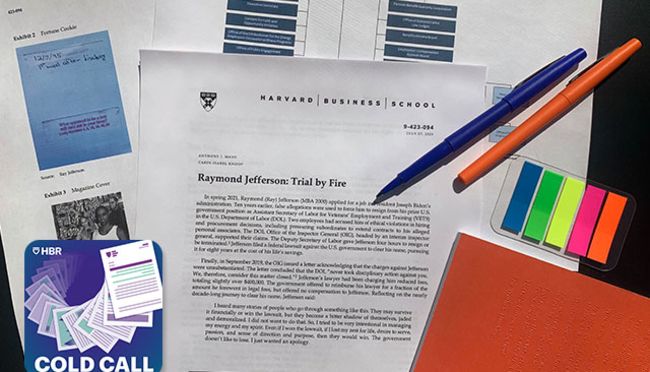
- 26 Mar 2024
- Cold Call Podcast
How Do Great Leaders Overcome Adversity?
In the spring of 2021, Raymond Jefferson (MBA 2000) applied for a job in President Joseph Biden’s administration. Ten years earlier, false allegations were used to force him to resign from his prior US government position as assistant secretary of labor for veterans’ employment and training in the Department of Labor. Two employees had accused him of ethical violations in hiring and procurement decisions, including pressuring subordinates into extending contracts to his alleged personal associates. The Deputy Secretary of Labor gave Jefferson four hours to resign or be terminated. Jefferson filed a federal lawsuit against the US government to clear his name, which he pursued for eight years at the expense of his entire life savings. Why, after such a traumatic and debilitating experience, would Jefferson want to pursue a career in government again? Harvard Business School Senior Lecturer Anthony Mayo explores Jefferson’s personal and professional journey from upstate New York to West Point to the Obama administration, how he faced adversity at several junctures in his life, and how resilience and vulnerability shaped his leadership style in the case, "Raymond Jefferson: Trial by Fire."

- 24 Jan 2024
Why Boeing’s Problems with the 737 MAX Began More Than 25 Years Ago
Aggressive cost cutting and rocky leadership changes have eroded the culture at Boeing, a company once admired for its engineering rigor, says Bill George. What will it take to repair the reputational damage wrought by years of crises involving its 737 MAX?

- 02 Jan 2024
- What Do You Think?

Do Boomerang CEOs Get a Bad Rap?
Several companies have brought back formerly successful CEOs in hopes of breathing new life into their organizations—with mixed results. But are we even measuring the boomerang CEOs' performance properly? asks James Heskett. Open for comment; 0 Comments.
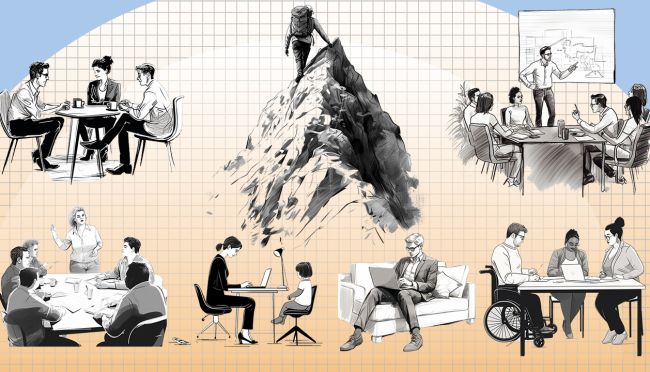
- Research & Ideas
10 Trends to Watch in 2024
Employees may seek new approaches to balance, even as leaders consider whether to bring more teams back to offices or make hybrid work even more flexible. These are just a few trends that Harvard Business School faculty members will be following during a year when staffing, climate, and inclusion will likely remain top of mind.
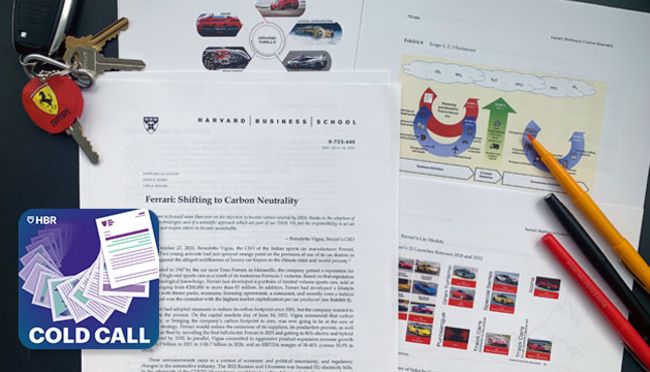
- 12 Dec 2023
Can Sustainability Drive Innovation at Ferrari?
When Ferrari, the Italian luxury sports car manufacturer, committed to achieving carbon neutrality and to electrifying a large part of its car fleet, investors and employees applauded the new strategy. But among the company’s suppliers, the reaction was mixed. Many were nervous about how this shift would affect their bottom lines. Professor Raffaella Sadun and Ferrari CEO Benedetto Vigna discuss how Ferrari collaborated with suppliers to work toward achieving the company’s goal. They also explore how sustainability can be a catalyst for innovation in the case, “Ferrari: Shifting to Carbon Neutrality.” This episode was recorded live December 4, 2023 in front of a remote studio audience in the Live Online Classroom at Harvard Business School.

- 05 Dec 2023
Lessons in Decision-Making: Confident People Aren't Always Correct (Except When They Are)
A study of 70,000 decisions by Thomas Graeber and Benjamin Enke finds that self-assurance doesn't necessarily reflect skill. Shrewd decision-making often comes down to how well a person understands the limits of their knowledge. How can managers identify and elevate their best decision-makers?

- 21 Nov 2023
The Beauty Industry: Products for a Healthy Glow or a Compact for Harm?
Many cosmetics and skincare companies present an image of social consciousness and transformative potential, while profiting from insecurity and excluding broad swaths of people. Geoffrey Jones examines the unsightly reality of the beauty industry.

- 14 Nov 2023
Do We Underestimate the Importance of Generosity in Leadership?
Management experts applaud leaders who are, among other things, determined, humble, and frugal, but rarely consider whether they are generous. However, executives who share their time, talent, and ideas often give rise to legendary organizations. Does generosity merit further consideration? asks James Heskett. Open for comment; 0 Comments.

- 24 Oct 2023
From P.T. Barnum to Mary Kay: Lessons From 5 Leaders Who Changed the World
What do Steve Jobs and Sarah Breedlove have in common? Through a series of case studies, Robert Simons explores the unique qualities of visionary leaders and what today's managers can learn from their journeys.

- 06 Oct 2023
Yes, You Can Radically Change Your Organization in One Week
Skip the committees and the multi-year roadmap. With the right conditions, leaders can confront even complex organizational problems in one week. Frances Frei and Anne Morriss explain how in their book Move Fast and Fix Things.
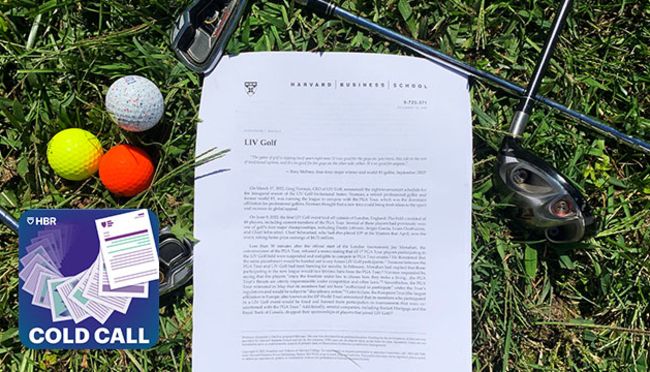
- 26 Sep 2023
The PGA Tour and LIV Golf Merger: Competition vs. Cooperation
On June 9, 2022, the first LIV Golf event teed off outside of London. The new tour offered players larger prizes, more flexibility, and ambitions to attract new fans to the sport. Immediately following the official start of that tournament, the PGA Tour announced that all 17 PGA Tour players participating in the LIV Golf event were suspended and ineligible to compete in PGA Tour events. Tensions between the two golf entities continued to rise, as more players “defected” to LIV. Eventually LIV Golf filed an antitrust lawsuit accusing the PGA Tour of anticompetitive practices, and the Department of Justice launched an investigation. Then, in a dramatic turn of events, LIV Golf and the PGA Tour announced that they were merging. Harvard Business School assistant professor Alexander MacKay discusses the competitive, antitrust, and regulatory issues at stake and whether or not the PGA Tour took the right actions in response to LIV Golf’s entry in his case, “LIV Golf.”

- 01 Aug 2023
As Leaders, Why Do We Continue to Reward A, While Hoping for B?
Companies often encourage the bad behavior that executives publicly rebuke—usually in pursuit of short-term performance. What keeps leaders from truly aligning incentives and goals? asks James Heskett. Open for comment; 0 Comments.

- 05 Jul 2023
What Kind of Leader Are You? How Three Action Orientations Can Help You Meet the Moment
Executives who confront new challenges with old formulas often fail. The best leaders tailor their approach, recalibrating their "action orientation" to address the problem at hand, says Ryan Raffaelli. He details three action orientations and how leaders can harness them.

How Are Middle Managers Falling Down Most Often on Employee Inclusion?
Companies are struggling to retain employees from underrepresented groups, many of whom don't feel heard in the workplace. What do managers need to do to build truly inclusive teams? asks James Heskett. Open for comment; 0 Comments.

- 14 Jun 2023
Every Company Should Have These Leaders—or Develop Them if They Don't
Companies need T-shaped leaders, those who can share knowledge across the organization while focusing on their business units, but they should be a mix of visionaries and tacticians. Hise Gibson breaks down the nuances of each leader and how companies can cultivate this talent among their ranks.

Four Steps to Building the Psychological Safety That High-Performing Teams Need
Struggling to spark strategic risk-taking and creative thinking? In the post-pandemic workplace, teams need psychological safety more than ever, and a new analysis by Amy Edmondson highlights the best ways to nurture it.
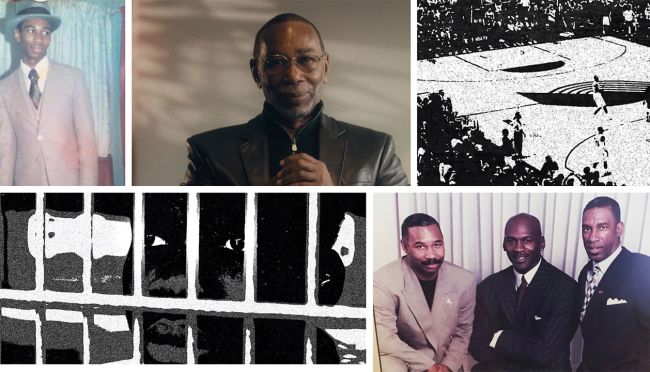
- 31 May 2023
From Prison Cell to Nike’s C-Suite: The Journey of Larry Miller
VIDEO: Before leading one of the world’s largest brands, Nike executive Larry Miller served time in prison for murder. In this interview, Miller shares how education helped him escape a life of crime and why employers should give the formerly incarcerated a second chance. Inspired by a Harvard Business School case study.
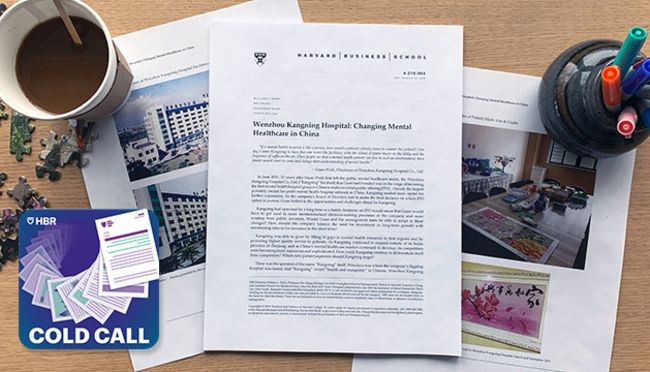
- 23 May 2023
The Entrepreneurial Journey of China’s First Private Mental Health Hospital
The city of Wenzhou in southeastern China is home to the country’s largest privately owned mental health hospital group, the Wenzhou Kangning Hospital Co, Ltd. It’s an example of the extraordinary entrepreneurship happening in China’s healthcare space. But after its successful initial public offering (IPO), how will the hospital grow in the future? Harvard Professor of China Studies William C. Kirby highlights the challenges of China’s mental health sector and the means company founder Guan Weili employed to address them in his case, Wenzhou Kangning Hospital: Changing Mental Healthcare in China.
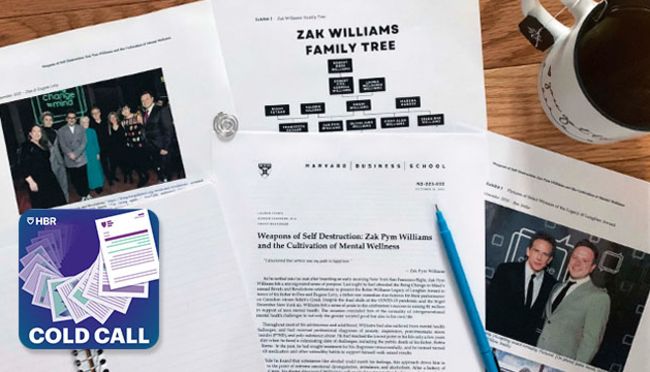
- 09 May 2023
Can Robin Williams’ Son Help Other Families Heal Addiction and Depression?
Zak Pym Williams, son of comedian and actor Robin Williams, had seen how mental health challenges, such as addiction and depression, had affected past generations of his family. Williams was diagnosed with generalized anxiety disorder, depression, and post-traumatic stress disorder (PTSD) as a young adult and he wanted to break the cycle for his children. Although his children were still quite young, he began considering proactive strategies that could help his family’s mental health, and he wanted to share that knowledge with other families. But how can Williams help people actually take advantage of those mental health strategies and services? Professor Lauren Cohen discusses his case, “Weapons of Self Destruction: Zak Pym Williams and the Cultivation of Mental Wellness.”

- 11 Apr 2023
The First 90 Hours: What New CEOs Should—and Shouldn't—Do to Set the Right Tone
New leaders no longer have the luxury of a 90-day listening tour to get to know an organization, says John Quelch. He offers seven steps to prepare CEOs for a successful start, and three missteps to avoid.
- SUGGESTED TOPICS
- The Magazine
- Newsletters
- Managing Yourself
- Managing Teams
- Work-life Balance
- The Big Idea
- Data & Visuals
- Reading Lists
- Case Selections
- HBR Learning
- Topic Feeds
- Account Settings
- Email Preferences
6 Common Leadership Styles — and How to Decide Which to Use When
- Rebecca Knight

Being a great leader means recognizing that different circumstances call for different approaches.
Research suggests that the most effective leaders adapt their style to different circumstances — be it a change in setting, a shift in organizational dynamics, or a turn in the business cycle. But what if you feel like you’re not equipped to take on a new and different leadership style — let alone more than one? In this article, the author outlines the six leadership styles Daniel Goleman first introduced in his 2000 HBR article, “Leadership That Gets Results,” and explains when to use each one. The good news is that personality is not destiny. Even if you’re naturally introverted or you tend to be driven by data and analysis rather than emotion, you can still learn how to adapt different leadership styles to organize, motivate, and direct your team.
Much has been written about common leadership styles and how to identify the right style for you, whether it’s transactional or transformational, bureaucratic or laissez-faire. But according to Daniel Goleman, a psychologist best known for his work on emotional intelligence, “Being a great leader means recognizing that different circumstances may call for different approaches.”
- RK Rebecca Knight is a journalist who writes about all things related to the changing nature of careers and the workplace. Her essays and reported stories have been featured in The Boston Globe, Business Insider, The New York Times, BBC, and The Christian Science Monitor. She was shortlisted as a Reuters Institute Fellow at Oxford University in 2023. Earlier in her career, she spent a decade as an editor and reporter at the Financial Times in New York, London, and Boston.
Partner Center
CRCHD Announces the Establishment of Cancer Equity Leaders to Contribute to Health Equity Efforts, Host 2025 Event
April 8, 2024 , by CRCHD Staff
The NCI Center to Reduce Cancer Health Disparities is thrilled to announce the Cancer Equity Leaders (CEL), a diverse team of premier cancer research leaders who will reimagine and transform the future of cancer health equity. To achieve this aim, the group will work toward three objectives:
- Assess the landscape to elucidate critical strengths and gaps in cancer equity infrastructure.
- Prioritize the critical needs for expanding institutional capacity and achieving cancer health equity.
- Develop a strategic agenda to enhance the National Cancer Plan.
Through this work, the CEL will contribute to our understanding of cancer health equity and help CRCHD determine NCI’s diversity training, biomedical workforce development, and community outreach and engagement initiatives.
The CEL comprises 13 well-renowned and deeply respected cancer center and medical school leaders, with extensive expertise in the aforementioned areas and exceptional knowledge and understanding of all stages of the cancer continuum. See the full roster of this esteemed group below.
In 2025, the CEL team will host an event to hear and learn diverse perspectives across the cancer community to further advance NCI’s health equity efforts.
This initiative will be co-chaired by NCI CRCHD Director Sanya A. Springfield, Ph.D., and Karen Winkfield, M.D., Ph.D., Executive Director of the Meharry-Vanderbilt Alliance and Associate Director for Community Outreach & Engagement at the Vanderbilt-Ingram Cancer Center.
CEL Planning Committee Co-Chairs
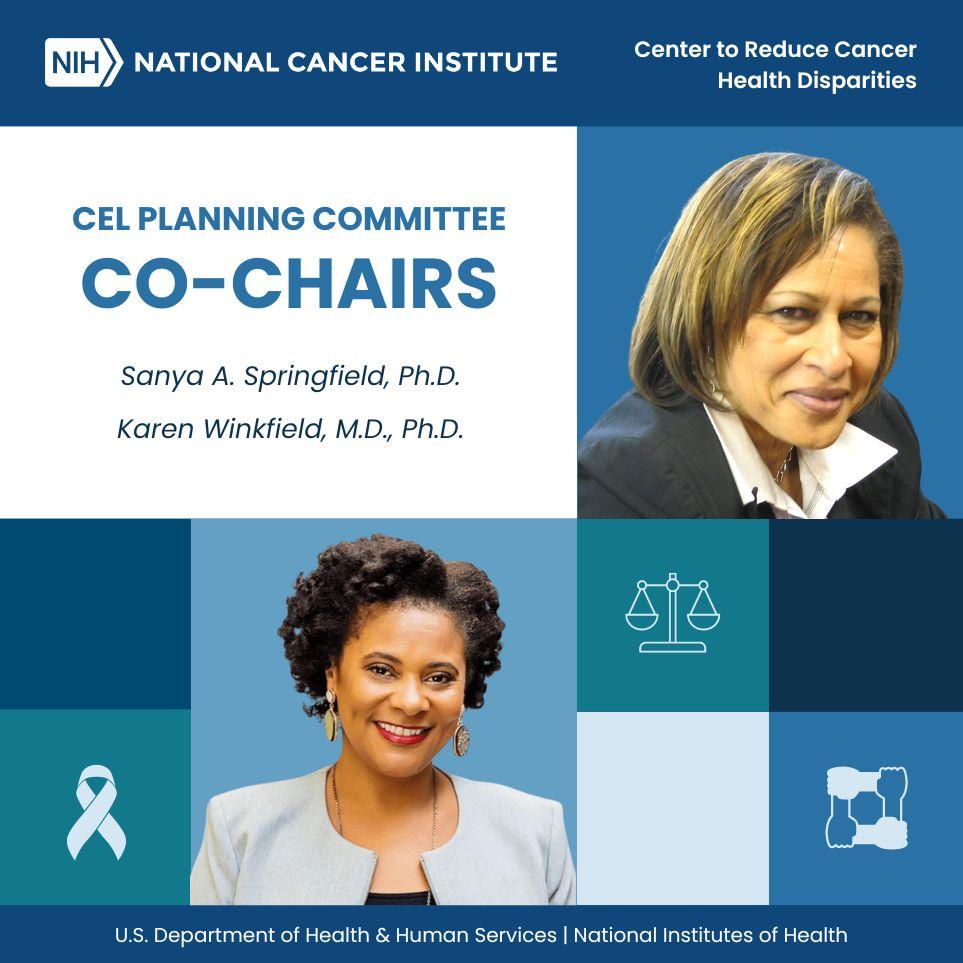
Sanya A. Springfield, Ph.D. Director, Center to Reduce Cancer Health Disparities National Cancer Institute
Karen Winkfield, M.D., Ph.D. Executive Director Meharry-Vanderbilt Alliance Associate Director for Community Outreach & Engagement Ingram Professor of Cancer Research Vanderbilt-Ingram Cancer Center Professor of Radiation Oncology Vanderbilt University School of Medicine Professor of Global Health Meharry Medical College
CEL Members
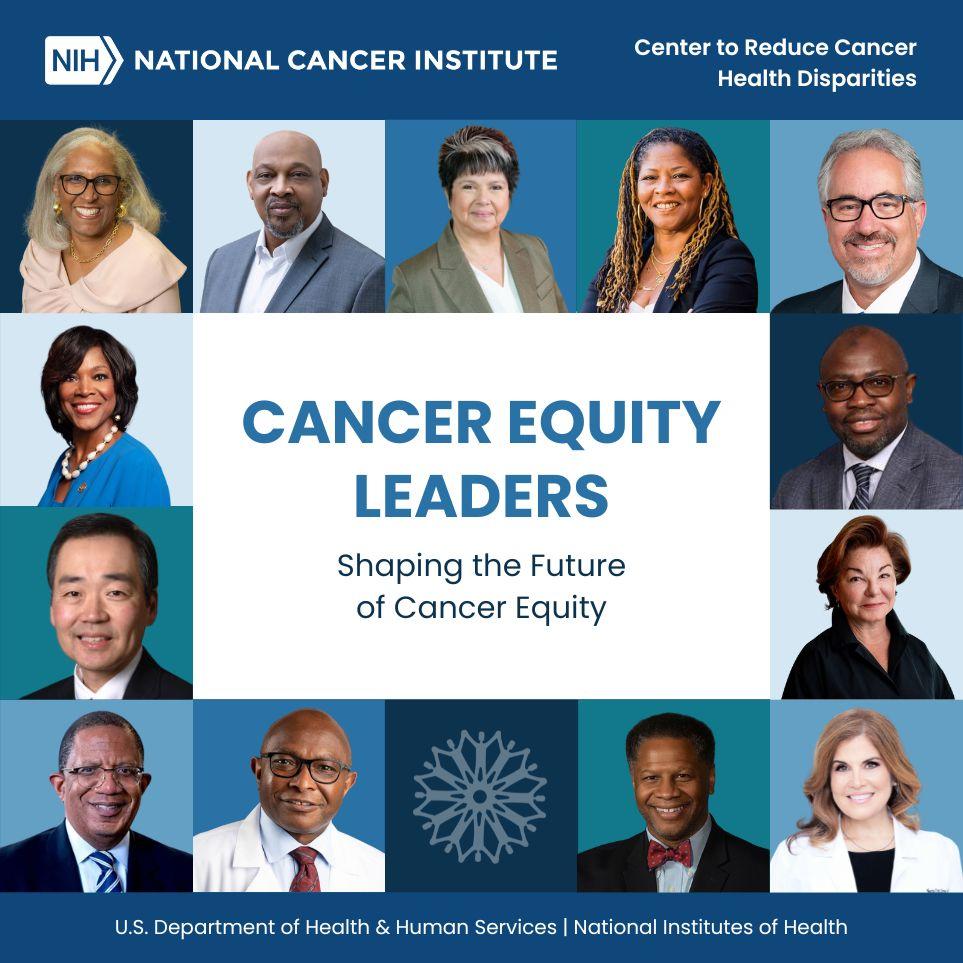
John Carpten, Ph.D. Director, City of Hope Comprehensive Cancer Center Director, Beckman Research Institute of City of Hope Chief Scientific Officer Irell & Manella Cancer Center Director’s Distinguished Chair Morgan & Helen Chu Director’s Chair of the Beckman Research Institute City of Hope
Marcia Cruz-Correa, M.D., Ph.D. Professor of Medicine & Biochemistry, University of Puerto Rico Medical Sciences Campus Investigator, UPR Comprehensive Cancer Center
Chanita Hughes-Halbert, Ph.D. Vice Chair for Research and Professor, Department of Population and Public Health Sciences Dr. Arthur and Priscilla Ulene Chair in Women’s Cancer, Keck School of Medicine Associate Director for Cancer Equity, Norris Comprehensive Cancer Center University of Southern California
Juanita Merchant, M.D., Ph.D. Chief of Gastroenterology and Hepatology Regents Professor of Medicine Associate Director for Basic Science, UACC Interim Director, UA Comprehensive Cancer Center University of Arizona, Tucson
Ruben Mesa, M.D. President, Atrium Health Levine Cancer Executive Director, Atrium Health Wake Forest Baptist Comprehensive Cancer Center Enterprise Senior Vice President, Atrium Health Vice Dean for Cancer Programs, Wake Forest University School of Medicine The Charles L. Spurr MD Professor of Medicine, Wake Forest University School of Medicine
Valerie Montgomery Rice, M.D. President and Chief Executive Officer Morehouse School of Medicine
Kunle Odunsi, M.D., Ph.D. Director, University of Chicago Medicine Comprehensive Cancer Center Dean for Oncology, Biological Sciences Division The AbbVie Foundation Distinguished Service Professor Department of Obstetrics and Gynecology University of Chicago
Taofeek Owonikoko, M.D., Ph.D. Director, University of Maryland Greenebaum Comprehensive Cancer Center Marlene and Stewart Greenebaum Professor in Oncology, Department of Medicine Executive Director, UMSOM Program in Oncology Senior Associate Dean for Cancer Programs, University of Maryland School of Medicine Associate Vice President for Cancer Programs, University of Maryland, Baltimore
Ben Ho Park, M.D., Ph.D. Director, Vanderbilt-Ingram Cancer Center Benjamin F. Byrd, Jr. Chair in Oncology Professor of Medicine Division of Hematology/Oncology Vanderbilt University Medical Center
Yolanda Sanchez, Ph.D. The Maurice and Marguerite Liberman Distinguished Chair in Cancer Research Professor, Department of Internal Medicine Director & CEO, University of New Mexico Comprehensive Cancer Center
Selwyn Vickers, M.D. President and CEO, Memorial Sloan Kettering Cancer Center
Cheryl Willman, M.D. The Stephen and Barbara Slaggie Enterprise Executive Director, Mayo Clinic Cancer Programs Director, Mayo Clinic Comprehensive Cancer Center The David A. Ahlquist, M.D. Professorship in Cancer Research Professor and Consultant Department of Laboratory Medicine and Pathology Mayo Clinic College of Medicine & Science
Robert Winn, M.D. Director and Lipman Chair in Oncology, VCU Massey Comprehensive Cancer Center Senior Associate Dean for Cancer Innovation and Professor of Pulmonary Disease and Critical Care Medicine VCU School of Medicine
Featured Posts
April 8, 2024, by CRCHD Staff
February 15, 2024, by CRCHD Staff
February 6, 2024, by CRCHD Staff

NIH Leaders Attend Signing of Executive Order on Women’s Health

Vice President Kamala Harris (l) smiles with NICHD Director Dr. Diana Bianchi (c) and NCI Director Dr. Kimryn Rathmell.
NIH leaders attended the historic signing of an Executive Order (EO) to advance women’s health research and innovation. The directive, signed by President Joe Biden on Mar. 18, integrates and prioritizes women’s health across the federal research portfolio.
“For far too long, scientific and biomedical research excluded women and undervalued the study of women’s health,” said Biden at the White House signing. “The resulting research gaps mean that we know far too little about women’s health across women’s lifespans, and those gaps are even more prominent for women of color, older women and women with disabilities…It is time to pioneer the next generation of discoveries in women’s health.”

Attending the historic signing at the White House are (from l) Bianchi; NIAID Director Dr. Jeanne Marrazzo; NIAMS Director Dr. Lindsey Criswell; Rathmell; NIH Director Dr. Monica Bertagnolli; NIH Deputy Director for Program Coordination, Planning and Strategic Initiatives Dr. Tara Schwetz; ORWH Director Dr. Janine Clayton; and NHLBI Director Dr. Gary Gibbons.
The EO’s directives will enable research that closes gaps to improve the health of all women. This guidance will bolster NIH-wide efforts to prevent, diagnose and treat health conditions unique to women, paving the way for better, more personalized care.
“I was honored to be a part of this historic event,” said Dr. Kimryn Rathmell, director of the National Cancer Institute, in a social media post. “Supporting research on women’s health isn’t just about equality, it’s about understanding unique health challenges, advancing treatments and empowering women to live healthier, fuller lives.”
Rathmell was one of several NIH institute directors and leaders in the Office of the Director to join NIH Director Dr. Monica Bertagnolli at the signing that was also attended by Vice President Kamala Harris, First Lady Dr. Jill Biden and Secretary of the Department of Health and Human Services Xavier Becerra.
The full text of the EO can be found at https://bit.ly/3xttFLh .

President Joe Biden signs an Executive Order to advance women’s health research and innovation, as supporters of the directive applaud.
AlphaSense, a Goldman Sachs–backed AI research startup valued at $2.5B, gears up for IPO as it crosses $200M in annual recurring revenue

Hedge fund manager Cynthia Paul started using the research platform AlphaSense more than 10 years ago while she was working at George Soros’s family office.
She had enlisted all the analysts on her team to track down a data point—and one of them came back so quickly, showing her an answer on his computer screen, that she almost didn’t believe him. The analyst had found the figure via AlphaSense’s AI-powered search engine, which uses machine learning to pull from a dataset of public documents and SEC filings, transcripts, and research.
“I was impressed enough to try the product myself,” says Paul, who would soon ask AlphaSense if Soros Fund Management could invest in the firm, and would later back the company again when she launched her own hedge fund. Research startup AlphaSense now boasts more than 4,000 corporate customers, including more than 80% of the S&P 100, who typically pay between $10,000 or $20,000 annually per seat to follow their competitors, track regulatory approvals, or research M&A targets.
With the help of developments in generative AI, AlphaSense CEO Jack Kokko says he is seeing heightened interest in the platform—both from its users, and its swath of investors, ranging from Goldman Sachs , CapitalG, and Viking Global. AlphaSense hit $200 million in annual recurring revenue at the end of last year—doubling its ARR from summer 2022—and Kokko is now thinking about how to double that figure, while setting his sights on the right time to take the company public. “We’re suddenly a lot closer to that,” Kokko tells Fortune in an interview.
AlphaSense has increased its headcount by 20% since January 2023 and opened an office in Singapore. This month, AlphaSense hired a new chief marketing officer, Heather Zynczak—who was part of the executive team that took software company Pluralsight public—as it tries to lay the groundwork for an IPO.
“There’s still a lot to do, of course, when you actually decide to go and file,” Kokko says.
‘The poster child’
Twenty-five years ago—during the roaring dotcom boom—Kokko was working as an investment banking analyst for Morgan Stanley . He remembers the feeling of being a young analyst and walking into a client boardroom, his mind running over what data point he might have missed in his research—what overlooked item might end up “messing up that billion-dollar deal,” he says.
“That’s what stuck with me,” Kokko says, and what would ultimately lead him and his Wharton School classmate, Raj Neervannan, to start working on a search engine that could marry the burgeoning technology of artificial intelligence with research about companies.
The key to the AlphaSense platform, which Kokko and Neervannan started building in 2011, would be its dataset. AlphaSense’s models pull from SEC filings, equity analyst research, industry journals, patent filings, earnings call transcripts, and other public documents and sources. Its two acquisitions over the years—financial analysis company Sentieo as well as expert interview transcription service Stream by Mosaic—have helped expand that dataset. Users can search for things like layoff events or patents, and AlphaSense’s AI models will spit out the relevant documents.
Kokko ascribes the recent growth at his company, in part, to generative AI. Over the past couple of years, AlphaSense has incorporated a variety of large language models, including Anthropic’s recently released Claude 3, into its own in-house AI systems, which it fine-tunes with open-source models like Llama 2 and Mistral, to power new features. Where previously AlphaSense would categorize information and surface data points, now AlphaSense can help users connect the dots—summarizing information, offering industrywide analysis on what companies are saying about things like price inflation, or suggesting specific companies or competitors in sectors a user is researching.
“We’re constantly pushing what we’re able to automate for users and make them more effective at their work, and generative AI has been one of those things that really enabled big leaps in that,” Kokko says. “That has created a lot of demand—extra demand, perhaps—and a lot of attention to the use cases that we serve.”
That, plus the company’s focus on expansion into new markets like Singapore, were major contributors to AlphaSense doubling its ARR and helped attract attention from new investors. Last calendar year, amid a drought in venture capital funding to startups in sectors outside of AI, AlphaSense raised approximately $250 million in equity funding over two separate funding rounds. One of those rounds was in September, when the company raised $150 million at a $2.5 billion valuation in a deal led by BOND Capital and joined by previous investors CapitalG (one of Alphabet’s independent investing arms) and Goldman Sachs.
Darren Cohen, the CIO of Goldman Sachs’ growth equity team, sees AlphaSense as the perfect fit for their broader investment thesis: combining the infrastructure layer of AI (large language models built by companies like OpenAI or Anthropic) with a rich dataset and a specific workflow. “AlphaSense is, by far, the poster child,” Cohen tells Fortune. “It’s one of the largest positions in our fund.”
But AlphaSense still has a bit of work to do before it goes public. For one: diversifying its leadership team. There is only one woman—its new CMO—across AlphaSense’s eight-person executive team and five-person board of directors.
AlphaSense says it is currently interviewing female board candidates, and Goldman’s Cohen told Fortune that diversifying both the leadership team and board is one “of many things” AlphaSense is focused on pre-IPO. “We actually are in conversations and showing them potential candidates, some of [whom] I work closely with, which would be amazing additions. Stay tuned,” Cohen said.
The company is also updating its financial systems to handle the precise reporting necessary in the public markets and to ensure that investors can adequately compare it to other public SaaS companies, Kokko says. He anticipates that CMO Zynczak’s experience on public and private boards, in particular, will be able to guide AlphaSense on what pre- and post-IPO investors look for.
Of course, it remains to be seen exactly when the IPO markets will be deemed “open” again. While a few notable startups like Instacart and Reddit have made their debuts in recent months, listings overall have been few and far between.
Kokko won’t share an exact timeline for AlphaSense’s public listing other than to say it will depend on when the IPO market appears truly open. And given that the company raised some $250 million in equity funding just last year, Kokko says he has the capital to wait: “We’re not in a rush.”
Latest in Tech
- 0 minutes ago

Apple loses its spot as the world’s top seller of smartphones after tough China competition from brands like Xiaomi and Huawei

Europe is falling behind in generative AI, with the U.S. light years ahead. But the race is just getting started

Japan’s chip companies are fighting with ski resorts for construction workers as they try to build a new plant in chilly Hokkaido

Watch: Fortune Brainstorm AI London Livestream

Bitcoin ‘halving’ will cost crypto miners $10 billion a year in lost revenue and ‘could well determine who comes out ahead and who gets left behind’

Ford looks to convert Tesla owners with ‘Conquest Bonus Cash,’ offering $1,500 rebates for F-150 Lightning and Mustang Mach-E electric vehicles
Most popular.

Founder of Toms shoes went on a men’s retreat with other entrepreneurs to combat his loneliness and depression: ‘I lost a lot of my clear meaning and purpose’

Workers at Elon Musk’s Boring Co. accidentally dug too close to a supporting column of the Las Vegas monorail last year, forcing officials to briefly halt service

The ‘Oracle of Wall Street’ expands on why the ‘crisis of the American male’ will send home prices crashing 30%: Gaming, rampant loneliness, and not enough single women homebuyers

Car dealership owner turned politician goes back to college to study AI, machine learning: ‘There won’t be robots with red eyes coming after us any time soon’

Nike’s boss says remote work was hurting innovation, so the company realigned and is ‘ruthlessly’ focused on building a disruptive pipeline

Boeing’s CEO search has a new frontrunner—and insiders say it could mean a radical change for the $104 billion ailing planemaker
- Skip to main content
- Skip to main navigation
- Awards & Honors
- News by topic
- News archives
- E-Newsletter
- Tuesday Newsday
- UCSC Magazine
- Administrative Messages
Home / 2024 / April / Global social change leaders gather at UC Santa Cruz for Right Livelihood International Conference
Global social change leaders gather at UC Santa Cruz for Right Livelihood International Conference
April 09, 2024
By Allison Arteaga Soergel

Before being called to activism, Juan Pablo Orrego was an ecologist and musician in Chile, and Phyllis Omido was a working mother in Kenya. Both noticed dangerous injustices taking place around them that harmed people and ecosystems. Instead of looking away, they decided to take action. And, together with their communities, they mobilized successful social change campaigns that earned them global recognition as laureates of the Right Livelihood Foundation. Now, they’re coming to UC Santa Cruz to share their insights and perspectives with students, faculty, and members of the public.
From April 23 through 27, UC Santa Cruz will host social change leaders and student activists visiting from around the world as part of a series of events to celebrate the UCSC Right Livelihood Center’s 10th anniversary and the center’s new leadership role as the Global Secretariat of the Right Livelihood College. The Right Livelihood College network connects students and faculty with laureates of the Right Livelihood Foundation to work on education, scientific research, and practical activities that spread and upscale the work of laureates.
A new group of Right Livelihood Laureates are selected by the foundation each year, to recognize the impact of change-makers working for a just, peaceful, and sustainable world for all. Omido —dubbed the “Erin Brockovich of East Africa”—was inducted as a laureate in 2023 for her leadership in the battle for the justice and health of the Owino Uhuru community, which has suffered from lead poisoning ever since a battery smelting plant began operating in their village. Her use of litigation, advocacy, and media engagement has set vital legal precedents, affirming people’s right to a clean and healthy environment and the state’s responsibility to safeguard it.
Orrego was inducted in 1998, recognizing his decades of work to preserve the Biobío River, one of South America’s most spectacular and ecologically significant rivers. That campaign has become a symbol of the environmental and social struggle still ongoing in the country, connecting the dots between energy policy, environment, indigenous people’s rights, monopolies, and the neo-liberal development goals of the establishment. Orrego also now serves on the jury that chooses new Right Livelihood Laureates.
“Through Right Livelihood, I’ve found out about many heroes and heroines around the world doing amazing work,” he said. “But in that process, I’ve also learned about some of the worst atrocities on the planet today. So, fortunately and unfortunately, being a part of this organization has really widened my consciousness.”
Dave Shaw, the Right Livelihood Center coordinator at UC Santa Cruz, says the conference in April is intended to similarly widen the perspectives of all participants.
“I hope that people will take away a renewed vigor and commitment to making the world better through international and intergenerational collaboration,” he said. “We have a hub for this amazing global network right here in our backyard through the Right Livelihood Center, so I’m hoping more people will decide to get involved with that.”
Conference will launch new impact initiatives
The conference is also designed to launch a new international student network and faculty-laureate research clusters. It kicks off on April 23, with a series of dialogues, cultural exchanges, and social events for UCSC students and student delegates visiting from member institutions across the global Right Livelihood College Network. Throughout the week, students will work together to create a mission, goals, and project plans for a new Right Livelihood International Student Network.
Then, on April 24, an interdisciplinary colloquium hosted by the Latin American and Latino Studies Department will help graduate students, researchers, and faculty make research connections with visiting laureates and international student delegates. In particular, the conference will launch a research cluster partnership with laureates on the topic of “extractivism”: the large-scale extraction of raw materials for export from developing countries. Extractivism typically takes place at the detriment of local people and ecosystems and involves modern power imbalances that reflect histories of colonialism.
Professor of Latin American and Latino Studies Fernando Leiva has long studied extractivism in Latin America, and he coordinates a campus-wide research group on the topic. Leiva said he’s excited to expand that work by partnering with Right Livelihood Laureates and researchers and students at other institutions in the Right Livelihood College network.
“This is a chance to connect the enthusiasm, energy, and passion of undergraduates with faculty who have been thinking about these issues and with laureates who are directly connected to these issues in villages, barrios, neighborhoods, and communities around the world,” he said. “It’s a combination that I think can be tremendously fruitful in terms of research, action, and mutual support.”
Public events share insights from laureates
Extractivism will also be the theme of two public events. The first, taking place on April 24, starting at 6:30p.m. at UCSC’s Silicon Valley campus , will focus on ensuring a just transition to a green economy, through a conversation between Silicon Valley leaders and the visiting Right Livelihood Laureates. The group will discuss how to ensure that demand for resources like lithium for the transition to electric vehicles doesn’t end up contributing to increased environmental degradation or human rights violations and that those whose livelihoods currently depend on fossil fuel-based energy and transportation systems are able to find new opportunities.
Professor Chris Benner, faculty director of the Institute for Social Transformation , which supports the Right Livelihood Center, studies the relationships between technological change, economic opportunity, and environmental justice, and he expressed excitement about collaboration opportunities that could arise from the Silicon Valley event.
“This provides a pathway to deeper dialogue with people who are at the cutting edge of profound technological changes in our world, and some of those people care deeply about social justice and sustainability and want to do work that creates a better world,” he said. “So I’m hopeful that connecting those people with Right Livelihood Laureates could result in some powerful long-term partnerships.”
The second public event, taking place on campus April 25 at 7p.m. in the Merrill Cultural Center, will be a conversation with the laureates, moderated by Professor Leiva, on extractivism and how to eliminate resulting “sacrifice zones'' in the transition to a green economy. Leiva, who is a transnational Chilean and has done extensive research in the country, has previously met Orrego through Right Livelihood, and the two may have opportunities to work together more in the future through the new extractivism research cluster.
Orrego says he has come to think of his work protecting rivers—and his more recent efforts to raise awareness of the impacts of industrial farming and mining in Chile—as all being connected to a larger mission of fighting extractivism.
“I saw all of these issues as symptoms, and I knew that the disease was deeper,” Orrego said. “So I started looking into the development model of Chile, and I realized that, since the time of Spanish colonization, we have been trapped in a model of extractivism. This has had disastrous effects for the environment and for human rights, because whenever you are impacting the environment, you are also impacting people who depend on the environment.”
Inspiring action, promoting hope
Despite the massive scale of global problems like extractivism, the transformative work of 194 Right Livelihood Laureates across 75 countries demonstrates that change is possible. The conference intends to share that message of hope, especially with the next generation of change-makers.
An all-day teach-in on April 25 at the Merrill Cultural Center, in collaboration with the visiting laureates, international student ambassadors, and UCSC faculty, will aim to reach about 1,000 UC Santa Cruz students. The teach-in will be an opportunity for students to learn about social and environmental issues, the work of laureates, and effective strategies for organizing social movements. UC Santa Cruz Professor of Latin American and Latino Studies Jessica Taft, an expert in youth activism, is helping to organize this portion of the event.
Sharan Sethi, student co-chair of UCSC’s Right Livelihood Center, said the teach-in and public events will be a great way for more students on campus to learn about Right Livelihood and how they can get involved.
“One of the things that I really love about Right Livelihood is that the network addresses so many diverse issues going on across the world,” she said. “So if you have any interest in human rights, justice, peace, sustainability, or building your own activism skills, attending any part of this conference will give you meaningful skills, and you’ll learn a lot.”
Orrego hopes the conference might be a turning point that helps attendees think about what they can start doing today to bring about positive social change.
“Our planet is in turmoil, and we don’t have centuries to wake up from this nightmare, because the ecological clock is ruthless,” he said. “If we don’t comply with the operational guidelines of the biosphere, humanity's existence is at risk. But we have choices. We have history and memory to learn from. We can choose to stop doing the things that cause harm. If we don’t, we are wasting our human potential.”
University News
- University News Home
- Monthly Newsletter
Other News & Events
- Campus Calendars

- UCSC Chancellor
- Press Releases
- Contacts for Reporters
- Send us an email
- Report an accessibility barrier
- Land Acknowledgment
- Accreditation
Last modified: April 9, 2024 128.114.113.87

IMAGES
VIDEO
COMMENTS
What does a Research Leader do? Researchers work in almost every industry and are hired to recognize patterns and locate, analyze, and interpret data. They work in fields including academia, science, medicine, finance, and other sectors. Their workload depends upon and is influenced by their research goals. They cultivate information and gather ...
Research leadership is defined as the influence of one or more people on the research-related behaviour, attitudes or intellectual capacity of others. Three specific features of professorial research leadership are identified and examined: influence that enhances people's capacity to make appropriate choices, to achieve requisite standards, and ...
Understand how being an effective leader will contribute to future success. Leadership Strategies for the Researcher helps prepare clinical and translational investigators as they face the challenges inherent in establishing a research program. This one-day, in-person course features both interactive and didactic sessions, with a focus on best ...
A research leader is committed to learning and improving your research management skills and practices. You need to seek and accept constructive feedback from your team, peers, mentors, and other ...
Create space for everyone. Great leaders ensure everyone gets a chance to speak, and they acknowledge everyone's contributions. They create space for new ideas, encourage collaboration and ...
Effective research leadership is a multi-faceted journey that encompasses a range of crucial attributes and principles. From articulating clear goals and expectations to fostering open communication, recognizing achievements, and providing unwavering support in times of adversity, successful leaders are architects of a positive and productive ...
What makes us tick: lab leaders describe their research philosophies. Early-career encounters and experiences can help to shape leadership styles and the values that drive a research group's ...
New research leaders need to know about financials, reporting, and administrative obligations. If you are the research leader of a sponsored project with grant funding, then you are an academic entrepreneur. You need business skills because financial support and academic leadership come with rules, scrutiny, and new challenges.
Research leadership, a much neglected area of educational leadership and management, is disadvantaged by having an underdeveloped and inadequate knowledge base. This article represents a contribution to this knowledge base through a conceptual analysis. It presents as propositional knowledge an original theoretical model of the componential ...
Research teams improve their outcomes when they are found in an adequate organizational climate with positive leadership, clear goals, smart management techniques, and assertive communication patterns. Here are 10 tips for powerful leadership in a scientific context: Know your team: Make the most of every chance that you have to know the people ...
In this episode, Spanish neuroscience and mental health researcher Gemma Modinos talks about her own leadership journey as a group leader at King's College London and former chair of the Young ...
Research Leaders are academicians who oversee a group of researchers conducting a study. They are usually well-known researchers in their field of study or area of interest. They manage the group throughout the whole research process. They may orient them at the start of the engagement to ensure that everyone is on the same page.
The changing landscape presents a specific leadership challenge for the social sciences. Designing, leading and delivering, and simply working within large, complex team-based research projects demand skills that have often not been required or incentivised within the social sciences. This leadership challenge has implications for:
What does a Research Team Leader do? Research managers lead the execution of research projects by drafting proposals, selecting methods, supervising teams, managing budgets, and presenting findings. A market research firm may employ them, where they hold meetings with clients to discuss project objectives and agree on a budget; or in a ...
Research Leader / Supervisory Plant Biologist. Organization: USDA-ARS-MWA-PIRU. Role/Crops/Team: Dr. Gardner serves as the Research Unit's Research Leader and the Coordinator of the NC-7 Project, a Cooperative Multi-State Project between the State Agricultural Experiment Stations of the North Central Region and the USDA-ARS. Her role is to ...
8 Essential Qualities of Successful Leaders. by. Rebecca Knight. December 13, 2023. Patricia Marroquin/Getty Images. Summary. Becoming a great leader is a journey of continuous learning and growth ...
Based on real research leader resumes, 66.2% of research leaders have a bachelor's degree. Regarding higher education levels, 18.0% of research leaders have master's degrees. Even though most research leaders have a college degree, it's impossible to become one with only a high school degree or GED.
Leadership models. Although almost every leadership researcher seems to propose a new or modified definition of the construct, leadership is generally operationalised in two ways: (1) leadership as a formal role or (2) leadership as a social influence (Yukl and Van Fleet Citation 1992).Most of the leadership research focuses on the latter, which it aims to understand through operationalisation ...
Research Leaders support the growth of undergraduate research and creative scholarly activity across diverse disciplines within CAS and throughout OSU. Be a Research Leader Invite a Research Leader. Research Leaders are excited to visit your class, organization meeting, or other event and share tips for getting involved in research or creative ...
The Research Leaders Program is a new initiative to identify and develop the next generation of research leaders among the faculty at the University of Nebraska-Lincoln. It is sponsored by the Office of Research and Economic Development and delivered in partnership with the Center for Professional and Executive Development in the College of ...
Ulrich, a native of Germany, first came to Utah and Huntsman Cancer Institute a decade ago. As a renowned expert in cancer research with more than 450 scientific publications, she has led Huntsman Cancer Institute's research teams to an "exceptional" national rating, the highest rank achievable from the National Cancer Institute.
Executives who confront new challenges with old formulas often fail. The best leaders tailor their approach, recalibrating their "action orientation" to address the problem at hand, says Ryan Raffaelli. He details three action orientations and how leaders can harness them. 05 Jul 2023.
Summary. Research suggests that the most effective leaders adapt their style to different circumstances — be it a change in setting, a shift in organizational dynamics, or a turn in the business ...
Jointly published by DDI, The Conference Board, and EY, the Global Leadership Forecast 2018 is one of the most expansive leadership research projects ever conducted. Integrating data from more ...
This research was the initial study in an interactive co-production research project on leadership development, where researchers produce knowledge of both high practical relevance and scientific relevance, together with professionals (Svensson et al., 2007). Interactive research emphasizes joint learning between the participants and the ...
April 8, 2024, by CRCHD Staff . The NCI Center to Reduce Cancer Health Disparities is thrilled to announce the Cancer Equity Leaders (CEL), a diverse team of premier cancer research leaders who will reimagine and transform the future of cancer health equity.
NIH leaders attended the historic signing of an Executive Order (EO) to advance women's health research and innovation. The directive, signed by President Joe Biden on Mar. 18, integrates and prioritizes women's health across the federal research portfolio. "For far too long, scientific and biomedical research excluded women and ...
Thapar is presenting her research at the April 12 MSU Board of Trustees meeting. Tanushree Thapar is a fourth-year neuroscience major. She also studies entrepreneurship and innovation within the Broad College of Business and is a member of the Honors College. ... Student view: Bridging neuroscience, leadership and inclusive entrepreneurship ...
Research startup AlphaSense now boasts more than 4,000 corporate customers, including more than 80% of the S&P 100, who typically pay between $10,000 or $20,000 annually per seat to follow their ...
From April 23 through 27, UC Santa Cruz will host social change leaders and student activists visiting from around the world for the Right Livelihood International Conference, which includes a series of public events and will launch a new international student network and international research partnerships.